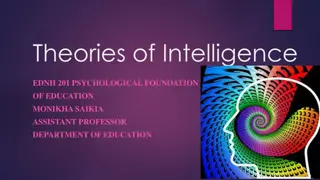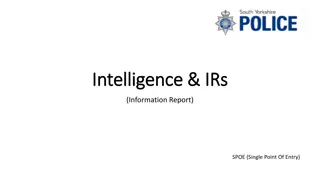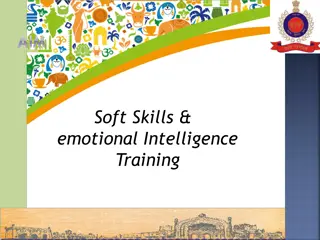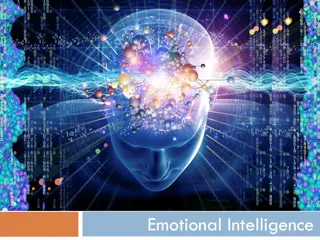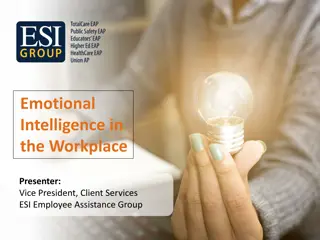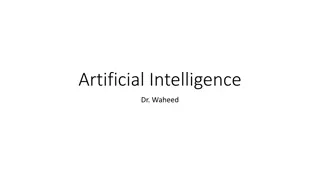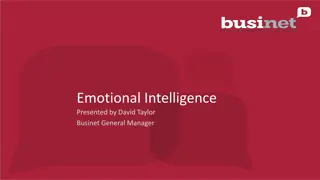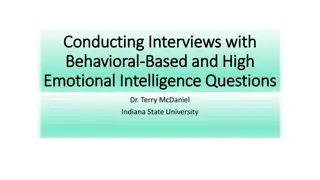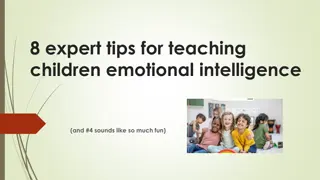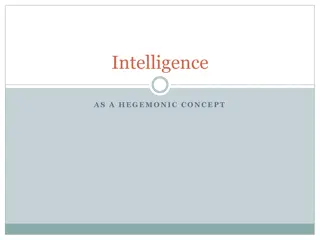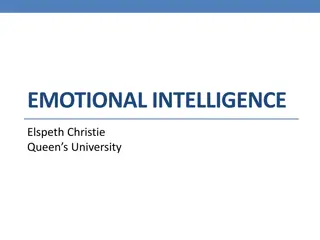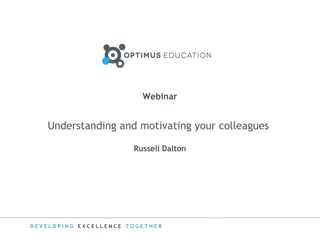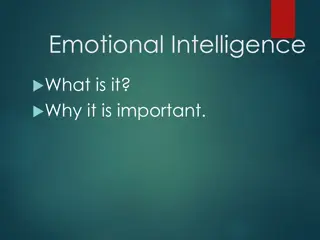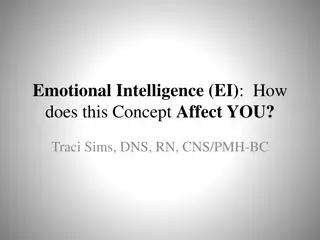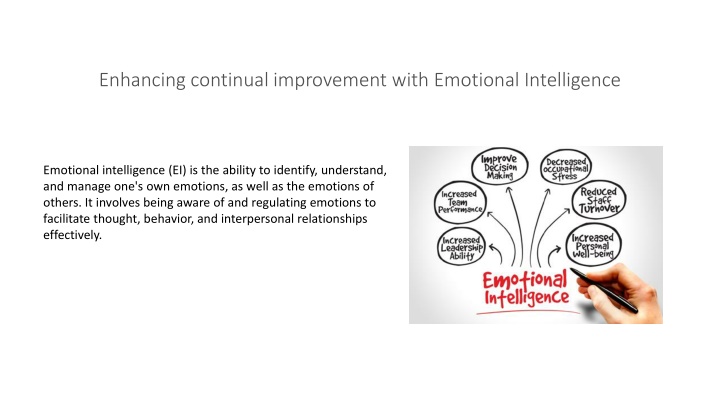
Enhancing Continual Improvement with Emotional Intelligence
Discover how Emotional Intelligence (EI) can boost personal and professional success by improving self-awareness, self-regulation, motivation, empathy, and social skills. Explore the factors influencing EI such as genetics, environment, education, culture, personality, age, and gender.
Download Presentation

Please find below an Image/Link to download the presentation.
The content on the website is provided AS IS for your information and personal use only. It may not be sold, licensed, or shared on other websites without obtaining consent from the author. If you encounter any issues during the download, it is possible that the publisher has removed the file from their server.
You are allowed to download the files provided on this website for personal or commercial use, subject to the condition that they are used lawfully. All files are the property of their respective owners.
The content on the website is provided AS IS for your information and personal use only. It may not be sold, licensed, or shared on other websites without obtaining consent from the author.
E N D
Presentation Transcript
Enhancing continual improvement with Emotional Intelligence Emotional intelligence (EI) is the ability to identify, understand, and manage one's own emotions, as well as the emotions of others. It involves being aware of and regulating emotions to facilitate thought, behavior, and interpersonal relationships effectively.
Enhancing continual improvement with Emotional Intelligence A mind tool Enhancing continual improvement Emotional intelligence is considered to be an important factor in personal and professional success. Individuals with higher levels of emotional intelligence are better able to manage stress, communicate effectively, navigate social situations, and build strong relationships. They are also more likely to be successful in leadership roles and have greater job satisfaction.
Enhancing continual improvement with Emotional Intelligence Five key components The concept of EI was first introduced by psychologists Peter Salovey and John Mayer in 1990, and popularized by author and journalist Daniel Goleman in the mid-1990s. According to Goleman, emotional intelligence is made up of five key components: 1.Self-awareness: The ability to recognize and understand one's own emotions, strengths, and weaknesses. 2.Self-regulation: The ability to manage and regulate one's own emotions, thoughts, and behaviors. 3.Motivation: The ability to use one's own emotions to motivate oneself and achieve goals. 4.Empathy: The ability to understand and relate to the emotions of others. 5.Social skills: The ability to manage and influence the emotions of others, communicate effectively, and build and maintain positive relationships.
Enhancing continual improvement with Emotional Intelligence Factors affecting EI 1.Genetics: There is evidence to suggest that genetic factors can influence EI, particularly in the areas of emotion recognition and regulation. 2.Environment: Early life experiences, such as parenting, can play a role in the development of EI. A supportive and nurturing environment can help individuals to develop strong emotional skills, while an abusive or neglectful environment can hinder emotional development. 3.Education: Education can also play a role in the development of EI. Programs that focus on emotional skills, such as social and emotional learning (SEL), can help individuals to develop emotional intelligence . 4.Culture: Cultural norms and expectations can influence how emotions are expressed and regulated. For example, some cultures may value emotional expression, while others may emphasize emotional restraint. 5.Personality: Certain personality traits, such as extraversion and openness, are associated with higher levels of emotional intelligence. 6.Age: EI tends to improve with age, as individuals gain more life experience and develop stronger emotional skills. 7.Gender: Research suggests that women tend to score higher than men on measures of emotional intelligence, although the reasons for this are not entirely clear.
Enhancing continual improvement with Emotional Intelligence Continual Improvement with EI Emotional intelligence (EI) can help to improve continual improvement in several ways: 1.Self-awareness: Emotional intelligence helps individuals to be aware of their emotions, strengths, and weaknesses. This awareness can help individuals to identify areas where they need to improve and take action to address them. 2.Empathy: Empathy is a key component of emotional intelligence that enables individuals to understand and connect with others' feelings and emotions. This understanding can help individuals to identify opportunities for improvement by understanding the perspectives and experiences of others. 3.Collaboration: Emotional intelligence can help individuals to work effectively in teams by building positive relationships, managing conflicts, and fostering open communication. Effective collaboration can lead to improved processes and better outcomes. 4.Adaptability: Emotional intelligence helps individuals to be flexible and adaptable in changing situations. This adaptability can help individuals to identify opportunities for improvement and adapt to new processes. 5.Resilience: Emotional intelligence helps individuals to manage stress and setbacks effectively. This resilience can help individuals to stay focused on continual improvement despite challenges and setbacks.
Enhancing continual improvement with Emotional Intelligence Challenges in EI Developing emotional intelligence (EI) can be challenging for a variety of reasons, including: 1.Lack of awareness: Many people may not be aware of their emotions, or they may struggle to identify and label them accurately. Without this awareness, it can be difficult to regulate emotions effectively. 2.Cultural barriers: Cultural differences in the expression and regulation of emotions can create challenges in developing emotional intelligence, particularly in diverse or multicultural settings. 3.Negative emotions: Negative emotions, such as anger, fear, and sadness, can be challenging to manage effectively. These emotions can be triggered by a variety of situations, and learning to regulate them requires practice and skill. 4.Resistance to change: Developing emotional intelligence often requires individuals to change their behavior and habits. This can be challenging for some people, particularly if they are resistant to change or have ingrained habits . 5.Lack of support: Developing emotional intelligence can be difficult without support from others. This support may come in the form of coaching, mentoring, or training. 6.Overcoming biases: Developing emotional intelligence requires individuals to overcome biases and stereotypes that may affect their perceptions of others. This can be challenging, particularly if these biases are deeply ingrained.
Enhancing continual improvement with Emotional Intelligence Application of EI Emotional intelligence (EI) has applications in a wide range of settings, including personal, educational, and professional contexts. Here are some examples of where EI is used: 1.Personal relationships: EI can help individuals to manage their emotions effectively in personal relationships, communicate more clearly and empathetically, and build stronger connections with others. 2.Education: EI can be used in educational settings to help students manage their emotions, build positive relationships, and develop self-awareness and self-regulation skills. 3.Workplace: EI is highly valued in the workplace, as it can help employees to manage stress, communicate effectively, work collaboratively, and build strong relationships with colleagues and clients . 4.Leadership: Leaders with high levels of emotional intelligence are often more effective in managing and motivating their teams, communicating effectively, and building positive workplace cultures. 5.Healthcare: EI is increasingly recognized as an important skill for healthcare professionals, as it can help them to provide empathetic and effective care to patients.
Enhancing continual improvement with Emotional Intelligence Future of EI Emotional intelligence (EI) is becoming increasingly important in today's world, and its future looks bright. Here are some potential developments and trends that could shape the future of emotional intelligence: 1.AI-assisted emotional intelligence: As artificial intelligence (AI) technology advances, it could be used to help individuals develop their emotional intelligence. For example, AI could be used to analyze speech patterns and provide feedback on communication style, or to provide personalized coaching and training. 2.Emotionally intelligent technology: There is a growing trend toward the development of emotionally intelligent technology, such as chatbots and virtual assistants that can recognize and respond to human emotions. This technology could be used in a wide range of applications, from customer service to mental health care. 3..Increased emphasis on emotional intelligence in education: There is growing recognition of the importance of emotional intelligence in education, and many schools and universities are starting to incorporate EI training and development into their curricula. This trend is likely to continue in the future. 4.Greater awareness of the importance of emotional intelligence in the workplace: As more companies recognize the benefits of emotional intelligence, there is likely to be greater emphasis on EI in the workplace, including training and development programs and the inclusion of EI assessments in hiring and promotion processes. 5.Emphasis on emotional intelligence in healthcare: There is increasing recognition of the importance of emotional intelligence in healthcare, particularly in fields such as nursing and mental health care. In the future, we are likely to see greater emphasis on the development of emotional intelligence skills in these fields.

